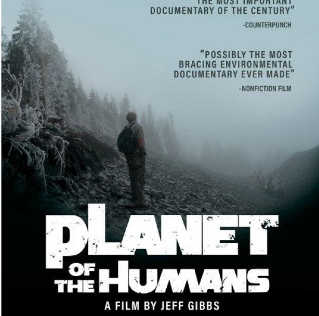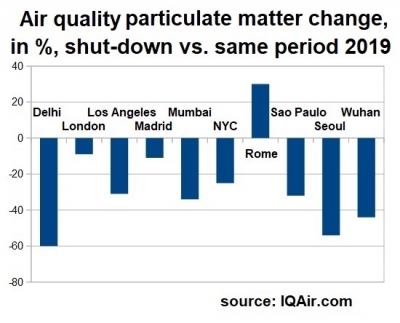 By Renée Owens
By Renée Owens
April 22, 2020 (San Diego’s East County) -- This year is the 50th anniversary of Earth Day! How can you honor Mother Earth while sheltering at home? Perhaps the most powerful thing you can do right now is sit back and watch a movie. Specifically, the groundbreaking documentary Planet of the Humans, just aired and free to watch on Youtube. A decade in the making, produced by Berkeley University Professor Ozzie Zehner and Michael Moore, it reveals astonishing and profound revelations about the green energy movement that I guarantee you will have never heard before.
The film takes no prisoners. This is not your Inconvenient Truth telling us how subsidized fossil fuel CEOs have made us indentured slaves to petroleum. We have come a long way in understanding the urgency of the climate and extinction crisis, but almost no one in the mainstream media, at the international climate conferences, in the think tank board rooms, is questioning if renewable energy technology can be our savior. This film steps into those controversial waters like none before it.
Some of you are going to hate it. Some are going to attack the messenger, commit whataboutism and holler false equivalencies from the nethersphere of Industries That Destroy Nature. Is it because what the film exposes can’t be true? Watch it, then put on your critical thinking cap and ask who has the most inculcated motive to deceive; the filmmakers who have been environmental activists most of their lives, or the venture capitalists that it exposes?
 The film digs deeper than dirty coal mines in revealing the greenhouse gas generating, hazardous chemical underbelly that fuels the green movement that is failing our planet more than it is rescuing it. Speculation? Hyperbole? No, the film’s urgency is based on genuine planetary exigencies of extinction of our own species as well as others. My colleagues and I have been broadcasting these concerns from the (solarized) rooftops for so long we are exhausted and discouraged. But when you are up against a trillion-dollar machine that exploits an entire movement of good people and noble intentions, even whistleblowers are easily ignored. Bless these filmmakers for the courage to do this, they are going to be lambasted and their supporters gaslighted. And of course the unscrupulous conservative propagandists will jump on the bandwagon throwing ad hominem attacks at Moore, their favorite celebrity to hate, while praising the film’s criticism of environmental leaders as they conveniently ignore the fact that their industry is excoriated every 5 minutes in the film.
The film digs deeper than dirty coal mines in revealing the greenhouse gas generating, hazardous chemical underbelly that fuels the green movement that is failing our planet more than it is rescuing it. Speculation? Hyperbole? No, the film’s urgency is based on genuine planetary exigencies of extinction of our own species as well as others. My colleagues and I have been broadcasting these concerns from the (solarized) rooftops for so long we are exhausted and discouraged. But when you are up against a trillion-dollar machine that exploits an entire movement of good people and noble intentions, even whistleblowers are easily ignored. Bless these filmmakers for the courage to do this, they are going to be lambasted and their supporters gaslighted. And of course the unscrupulous conservative propagandists will jump on the bandwagon throwing ad hominem attacks at Moore, their favorite celebrity to hate, while praising the film’s criticism of environmental leaders as they conveniently ignore the fact that their industry is excoriated every 5 minutes in the film.
To appreciate how ground-breaking these ideas are, watch for the tsunami of criticism that is sure to follow; by the wealthiest energy companies, corporate media pundits, Big Greens, the biofuel industry, even the meat industry. Yes, that two second clip of how some companies render animal fat for biofuel is real: live cows tossed in a chipper. Even minimalist anti-cruelty laws don’t apply when sentient beings are marketed as commodities for energy profits. The green movement is not just about humans and the planet, it deeply affects animal ethics that are not mentioned in this film. It goes without saying the film is hardly comprehensive, it can’t be in an hour and half. Missing are interviews with those who have successfully demonstrated how to maneuver the reality that infinite growth on a finite planet is suicide, and how we need a planetary shift that begins on a spiritual level, not an economic one. Maybe that will be Part 2.
Viewers will be well-served to keep in mind that many of the flawed green groups mentioned in the film are comprised of dedicated, selfless activists and well-meaning donors who are either naïve to the shenanigans of the groups’ leaders or feel powerless to change them. The point is not to merely sit in judgement of the corrupted, it is to change the system that rewards them while empowering the good people, and that means we the consumers have enormous power if we choose to use it. Still, this is a convoluted uphill road to success. I have worked alongside energy companies of all kinds, monitored enormous wind and solar projects, participated in a D.C. lobby week with Michael Brune, helped a tropical Guarani tribe fight for land rights against Chevron, watched millionaire ranchers in the Llanos burn thousands of acres of pristine land for cattle and sugar cane, the latter supported by green groups who erroneously label their actions sustainable. These experiences have challenged me on every level regarding everything I was taught – and what I have taught others - about sustainability. The issues are complicated and cannot be tidily swept into All Good and All Bad categories, don’t fall for that dangerously simplistic red herring.
 The environmental movement at its core is about respect for life beyond our own, but also for that which sustains each of us more than our physical needs of clean air, clean water, and ecosystem services. It is a movement that fights for uncorrupted beauty, wild spaces to find peace and rejuvenation, spiritual and artistic inspiration. From the Deep Ecologists to pipeline protestors the movement has grown with much blood, sweat, and tears and is now being brutally sabotaged by the current federal administration. Understandably people who care about it are defensive of it being criticized. But like it or not the green energy movement has been corrupted; this film points out the pitfalls fed by corporate capitalism and inevitable exploitation. An Inconvenient Truth indeed. We need to grow up and accept that the biggest economic winners in a profoundly capitalist society, no matter who they are or what their ideology, are destructive, since by definition one cannot be at the top of the profit maximization pyramid by limiting profits due to exigencies of morality or justice. Ethical practices are considered a handicap to unlimited profiteering, and a market reliant on competition with immoral power brokers to survive.
The environmental movement at its core is about respect for life beyond our own, but also for that which sustains each of us more than our physical needs of clean air, clean water, and ecosystem services. It is a movement that fights for uncorrupted beauty, wild spaces to find peace and rejuvenation, spiritual and artistic inspiration. From the Deep Ecologists to pipeline protestors the movement has grown with much blood, sweat, and tears and is now being brutally sabotaged by the current federal administration. Understandably people who care about it are defensive of it being criticized. But like it or not the green energy movement has been corrupted; this film points out the pitfalls fed by corporate capitalism and inevitable exploitation. An Inconvenient Truth indeed. We need to grow up and accept that the biggest economic winners in a profoundly capitalist society, no matter who they are or what their ideology, are destructive, since by definition one cannot be at the top of the profit maximization pyramid by limiting profits due to exigencies of morality or justice. Ethical practices are considered a handicap to unlimited profiteering, and a market reliant on competition with immoral power brokers to survive.
To save the planet we must accept that an economy built on growth can no longer be our savior, there are too many of us in a finite world where the True Costs of energy production - no matter what kind of technology is used - is subsumed and hidden by the system itself. Conservation means limits on our materialism and population growth, and to consider these things we must be mature enough to admit, as the film’s director says, less is the new more. This film is step one. Step two is having conversations that stop tiptoeing around our societal dysfunction of worshipping profit over lives, regardless of political inclination. Actions begin with ideas, and without an articulated vision of what is truly possible – and what is broken - we will never move forward. Discussions must move beyond the rhetorical pabulum and embrace the paradigm shift that must happen if we are to avoid planetary suicide.
To paraphrase Dr. Cornel West, telling someone you love that they are screwing up is an act of courage and show of respect, because you believe that they can change and use their knowledge for good, and you support them in doing so. The message of hope here, in this film, is that truth is the way forward. As the director says, “the path to change comes from awareness.” Transformation can happen if we take control of our environmental movement from billionaires, and end our support of them and their endless war on planet earth. “If we get ourselves under control, all things are possible.” How do we do that? To quote Maya Angelou, “Courage is the most important of all the virtues because without courage, you can't practice any other virtue consistently.” Start there.
https://planetofthehumans.com/
Ms. Owens is resident of Alpine and has been a professional environmental consultant, college instructor, public speaker, and conservation biologist in San Diego and Latin America, and is President of the Wild Zone Conservation League.
The opinions in this editorial reflect the views of the author and do not necessarily reflect the views of East County Magazine. To submit an editorial for consideration, contact editor@eastcountymagazine.org.








Comments
Problematic movie but fine review
Earth Day Movie Article